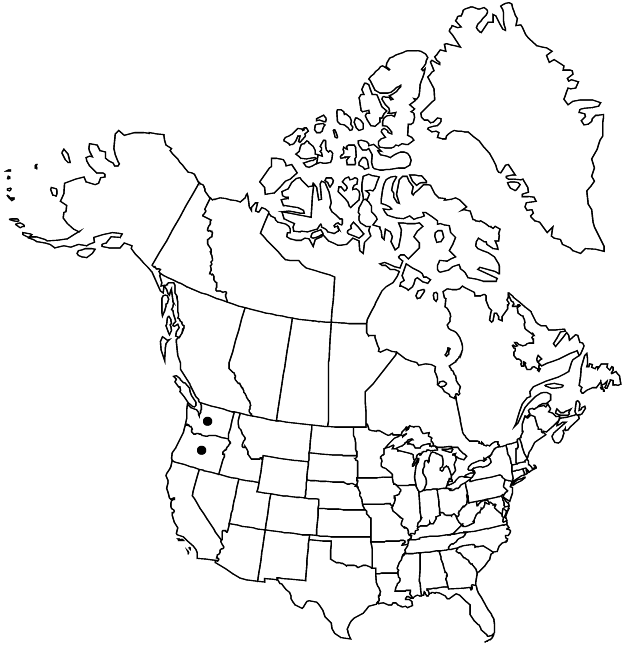Difference between revisions of "Eriogonum umbellatum var. haussknechtii"
Contr. W. Bot. 11: 6. 1903.
FNA>Volume Importer |
FNA>Volume Importer |
||
| Line 30: | Line 30: | ||
|elevation=1000-2500(-3100) m | |elevation=1000-2500(-3100) m | ||
|distribution=Oreg.;Wash. | |distribution=Oreg.;Wash. | ||
| − | |discussion=<p>Variety haussknechtii, as here circumscribed, is a high-elevation taxon found mainly on volcanic peaks in north-central Oregon (Benton, Clackamas, Hood River, and Wasco counties) and south-central Washington (Kittitas and Yakima counties). It is common on Mt. Hood and Mt. Adams. It typically grows with E. marifolium, and mixed collections often are found in herbaria; the two taxa have in common a distinctive olive green color of the adaxial leaf surfaces. Haussknecht’s sulphur flower is not always clearly distinct from var. modocense. It is occasionally seen in cultivation, especially in European gardens.</p> | + | |discussion=<p>Variety haussknechtii, as here circumscribed, is a high-elevation taxon found mainly on volcanic peaks in north-central Oregon (Benton, Clackamas, Hood River, and Wasco counties) and south-central Washington (Kittitas and Yakima counties). It is common on Mt. Hood and Mt. Adams. It typically grows with <i>E. marifolium</i>, and mixed collections often are found in herbaria; the two taxa have in common a distinctive olive green color of the adaxial leaf surfaces. Haussknecht’s sulphur flower is not always clearly distinct from <i></i>var.<i> modocense</i>. It is occasionally seen in cultivation, especially in European gardens.</p> |
|tables= | |tables= | ||
|references= | |references= | ||
| Line 54: | Line 54: | ||
|publication year=1903 | |publication year=1903 | ||
|special status= | |special status= | ||
| − | |source xml=https://jpend@bitbucket.org/aafc-mbb/fna-data-curation.git/src/ | + | |source xml=https://jpend@bitbucket.org/aafc-mbb/fna-data-curation.git/src/8f726806613d60c220dc4493de13607dd3150896/coarse_grained_fna_xml/V5/V5_681.xml |
|subfamily=Polygonaceae subfam. Eriogonoideae | |subfamily=Polygonaceae subfam. Eriogonoideae | ||
|genus=Eriogonum | |genus=Eriogonum | ||
Revision as of 18:40, 18 September 2019
Herbs, typically prostrate, sprawling mats, 0.5–1.5 × 1–4 dm. Aerial flowering stems spreading to erect, 0.3–0.6(–1.5) dm, thinly tomentose, without one or more leaflike bracts ca. midlength. Leaves typically in tight rosettes; blade usually broadly elliptic, 0.5–1.5(–2.5) × 0.5–1.2(–1.5) cm, tannish-tomentose abaxially, thinly tomentose or glabrous and olive green adaxially, margins plane. Inflorescences compact-umbellate; branches 0.1–1.5(–2) cm, thinly tomentose, without a whorl of bracts ca. midlength; involucral tubes 1.5–3.5 mm, lobes 1–4 mm. Flowers 2–6 mm; perianth bright yellow.
Phenology: Flowering Jun–Sep.
Habitat: Volcanic, sandy to gravelly slopes and ridges, mixed grassland and sagebrush communities, montane to subalpine conifer woodlands
Elevation: 1000-2500(-3100) m
Discussion
Variety haussknechtii, as here circumscribed, is a high-elevation taxon found mainly on volcanic peaks in north-central Oregon (Benton, Clackamas, Hood River, and Wasco counties) and south-central Washington (Kittitas and Yakima counties). It is common on Mt. Hood and Mt. Adams. It typically grows with E. marifolium, and mixed collections often are found in herbaria; the two taxa have in common a distinctive olive green color of the adaxial leaf surfaces. Haussknecht’s sulphur flower is not always clearly distinct from var. modocense. It is occasionally seen in cultivation, especially in European gardens.
Selected References
None.
